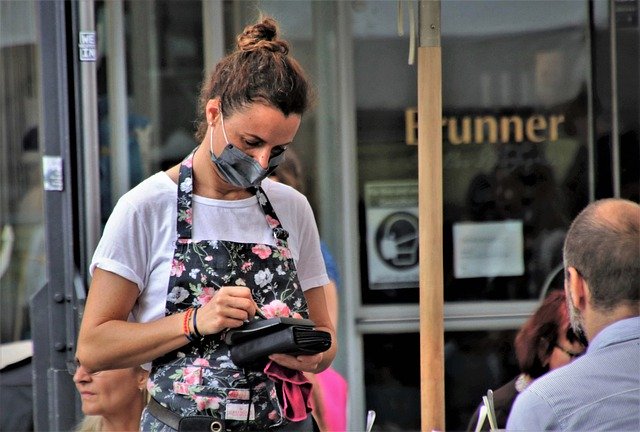
While the Covid-19 pandemic has disrupted all our lives, the ramifications for health and economic security have been greater for some people than for others. The pandemic has been worse for women, racial and ethnic minorities, and workers without college degrees. In addition, Covid-19 has caused disproportionate employment and health losses for workers whose jobs cannot be conducted remotely (e.g. working from home). As a general matter, social distancing is more difficult in non-remote jobs, where being physically present is a job requirement. As a result, policies (and protective actions by consumers) to limit transmission may differentially harm the employment prospects of these workers. Non-remote workers who remain on the job face a heightened risk of disease. Since these workers have lower socioeconomic status in general to begin with, these differential effects may magnify existing economic and health disparities.
To quantify these differential effects, we and our coauthors designed and implemented a high-frequency longitudinal survey of US households as part of the Understanding America Study (UAS), a nationally representative sample of around 7,000 US adult residents. The research results show that the job losses and, to a lesser extent, the health losses are disproportionately concentrated among workers with non-remote jobs. When we group workers by job type, we find that job losses are three times as high for non-remote workers: 24% of non-remote workers lost their jobs in late March and early April, compared to 8% of remote workers. This gap is larger than the gap for women, African Americans, or workers without a college degree compared to other workers. When we also consider household incomes (as measured before the pandemic), the disparity is even more striking: 40% of the poorest non-remote workers lost their jobs during this period, compared to 5% of the wealthiest remote workers.
We also find a health gap between remote and non-remote workers. Non-remote workers exhibited more respiratory symptoms and perceived higher Covid-19 infection risk than their remote counterparts, consistent with greater risk of exposure. This finding suggests a trade-off for many non-remote workers between employment and respiratory health. Indeed, we show that non-remote workers practiced fewer work-related protective behaviors than remote workers, a difference resulting from the behavior of employed people.
Given the size of these effects, implementing effective policies to minimize job losses and reduce the unemployment gap between remote and non-remote workers is of paramount importance. Some politicians have promoted business re-openings as a tool for reducing unemployment and jump-starting the economy. Our study suggests otherwise: no substantial increase in employment occurred after the ending of non-essential business closures that took place in the US around May. Moreover, any modest increase in employment for non-remote workers may have come at the cost of worse respiratory health, since non-remote jobs increase workers’ exposure to pathogens.
The study shows that, while we may be all in this together, we are not all in this equally. Not addressing these differential effects with large-scale and swift redistribution of income on the one hand, and investing in efforts to reduce the viral spread and find effective cures and vaccines on the other, is a failure that will cause massive socioeconomic costs and protracted human suffering.
© Manuela Angelucci and Daniel Bennett
Manuela Angelucci is an Associate Professor of Economics at the University of Texas at Austin, USA
Daniel Bennett is an Assistant Professor of Economics at the University of Southern California, USA
Find more IZA World of Labor coronavirus content on our curated topics pages: National responses to Covid-19 and Covid-19—Pandemics and the labor market.
Please note:
We recognize that IZA World of Labor articles may prompt discussion and possibly controversy. Opinion pieces, such as the one above, capture ideas and debates concisely, and anchor them with real-world examples. Opinions stated here do not necessarily reflect those of the IZA.